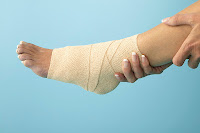During the injury healing process, inflammation occurs almost immediately and can last up to 5 days post-injury. This is when the body sends extra help to the injured area to help speed up recovery. While it may be uncomfortable with swelling, heat and redness in the injured area, this is an important part of the healing process. During this time dietary fat plays an important role. Omega-6 fats and trans-fats both promote inflammation in the body while omega-3 fats and monounsaturated fats both inhibit inflammation. As much as you want the swelling to go down, it is vital to allow the body to promote natural healing. Therefore, during the injury recovery process, especially within a few days of injury, you should up the intake of omega-6 fats slightly. The ideal ratio during recovery is 2-3 omega-6 fats to every omega-3 fat. The easiest way to do this, without getting into calculating fat contents, is to increase your intake of olive oil, mixed nuts, avocados, flax oil, ground flax, and other seeds, etc., making sure to get some of each fat source every day. By eating these foods, you'll likely balance out the saturated fats naturally present in your protein sources. In addition to that, add approximately 3-6g of fish oil while decreasing your omega-6 fat (i.e., corn oil, safflower oil, processed foods) intake.
Another route you can take to help your body recover from injury is to add certain spices/herbs to your daily nutrition plan. Because of the side effects of NSAIDs (non-steroidal anti-inflammatory drugs) like ibuprofen and naproxen sodium, many people rely on the anti-inflammatory properties of herbs and spices. Theoretically, NSAIDs should only be taken during the acute phase of the injury (5 days post injury) because when taken early in the healing process, it rapids blocks the inflammation process. Remember, this is an important phase because the body sends chemicals to the affected area to clean up the injury and start the healing process. If inflammation is blocked too early, the body may take longer to heal. Some herbs and spices that are helpful are:
- Curry powder/turmeric – This member of the ginger family has long been used as an anti-inflammatory and for wound healing. The active ingredient, curcumin, is likely responsible for the effects. Aim for 1 tsp per day of the powder or 400-600mg of the supplement, 3 times per day.
- Garlic – This has been shown to inhibit inflammatory enzymes. Adding it to the diet is helpful, but a supplement might be even better. Aim for 2-4 garlic cloves each day (if you can tolerate it) or 600 to 1,200mg of aged garlic extract.
- Boswellia – A favorite of Ayurvedic medicine, boswellia has many pharmacological uses. As an anti-inflammatory, try 300mg 3 times per day.
- Pineapple – Bromelain, found in pineapple, is another anti-inflammatory that’s great for digestion and for inflammation/pain relief. Aim for 2 cups of pineapple per day or 500-1,000mg in supplemental form.
Finally, macronutrients such as protein, carbs and fat should be consumed in sufficient quantities to help the body heal. Protein should be about 1g per pound of body weight; 1/3 of your diet should come from fat and that amount should be further broken down to include 1/3 saturated fat, 1/3 monounsaturated fat, and 1/3 polyunsaturated fat. In terms of carbohydrates, there is no recommended level for injury recovery. You should consume enough carbohydrates to support brain function and provide adequate macronutrient intake.
The important thing to remember is to be sure to eat frequently throughout the day and incorporate the principles listed above to ensure you are consuming high quality, nutrient-dense foods. Your body will recover quicker and you will be back on the playing field again. If you still need help with figuring out what to eat during injury recovery, contact PROMATx Health Club and set up an appointment with our nutrition specialist. We are here to help and we are able to guide you through your recovery process.




No comments:
Post a Comment